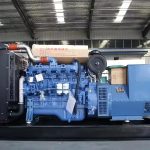Introduction
Environmental testing plays a crucial role in ensuring the safety, reliability, and performance of various products, materials, and components in a wide range of industries. From automotive and aerospace to electronics and construction, environmental testing helps to identify potential weaknesses, defects, and vulnerabilities that could impact the quality and longevity of these products. One essential tool used in environmental testing is the diesel generator, which provides a reliable and efficient source of power to simulate various environmental conditions and stressors. In this article, we will explore the key features and benefits of diesel generators for environmental testing, highlighting their efficiency, reliability, and sustainability in ensuring accurate and consistent testing results.
Efficiency of Diesel Generators in Environmental Testing
Diesel generators are known for their high efficiency and power output, making them ideal for providing a stable and reliable source of electricity for environmental testing applications. The combustion of diesel fuel in the generator's engine produces a high amount of energy, which is converted into electrical power through an alternator. This process ensures a consistent and uninterrupted power supply, essential for maintaining the integrity of environmental testing procedures.
500kw diesel generator for remote drilling operations of the key advantages of diesel generators is their ability to operate continuously for extended periods without the need for frequent refueling. This is especially critical in environmental testing, where tests can run for days or even weeks to simulate long-term exposure to various environmental conditions. The fuel efficiency of diesel generators helps to minimize downtime and ensure that testing procedures can be carried out smoothly and efficiently.
In addition to their fuel efficiency, diesel generators are also highly versatile and can be easily transported to different testing locations. This flexibility allows environmental testing facilities to conduct tests in a variety of settings, ranging from controlled laboratory environments to outdoor field testing sites. The portability of diesel generators makes them an essential tool for conducting on-site testing, where access to a reliable power source may be limited.

Reliability of Diesel Generators in Environmental Testing
Reliability is a critical factor in environmental testing, where even the slightest power interruption or fluctuation can compromise the accuracy and validity of test results. Diesel generators are renowned for their robust construction and dependable performance, making them a trusted choice for powering a wide range of environmental testing equipment and systems.
The durability of diesel generators stems from their rugged design and high-quality components, which are built to withstand the rigors of continuous operation in demanding testing environments. Whether subjected to extreme temperatures, humidity levels, or vibration, diesel generators are engineered to deliver consistent power output without faltering, ensuring uninterrupted testing procedures and reliable data collection.
Moreover, diesel generators are equipped with advanced safety features and automatic shutdown mechanisms to protect against potential malfunctions or overloads. These built-in safeguards help to prevent damage to the generator and connected equipment, as well as ensure the safety of personnel working in the testing facility. The reliability of diesel generators minimizes the risk of downtime and ensures that environmental testing can proceed smoothly and efficiently without any disruptions.
Sustainability of Diesel Generators in Environmental Testing
While diesel generators are known for their efficiency and reliability, concerns have been raised about their environmental impact due to the combustion of fossil fuels. In recent years, there has been a growing emphasis on sustainability and reducing carbon emissions in various industries, including environmental testing. However, advancements in technology have led to the development of more eco-friendly diesel generators that offer improved fuel efficiency and reduced environmental footprint.
One of the key innovations in sustainable diesel generators is the integration of advanced emission control systems, such as diesel particulate filters (DPF) and selective catalytic reduction (SCR) systems. These technologies help to minimize the release of harmful pollutants and greenhouse gases into the atmosphere, thereby reducing the environmental impact of diesel generator operation. By adhering to strict emission standards and regulations, modern diesel generators can operate more cleanly and sustainably, making them a viable option for environmental testing facilities seeking to minimize their carbon footprint.
Furthermore, the use of alternative fuels, such as biodiesel and synthetic diesel, can further enhance the sustainability of diesel generators in environmental testing applications. These renewable fuel sources offer a greener alternative to traditional diesel fuel, reducing reliance on fossil fuels and mitigating the environmental impact of generator operation. By incorporating sustainable fuel options into their operations, environmental testing facilities can demonstrate their commitment to environmental stewardship and sustainable practices.
Conclusion
Diesel generators play a vital role in environmental testing, providing a reliable, efficient, and sustainable source of power to simulate various environmental conditions and stressors. Their high efficiency, reliability, and sustainability make them an indispensable tool for ensuring accurate and consistent testing results across a wide range of industries. By leveraging the benefits of diesel generators, environmental testing facilities can conduct tests with confidence, knowing that they have a dependable power source that meets their performance and environmental requirements. As technology continues to evolve, diesel generators are expected to further enhance their efficiency, reliability, and sustainability, cementing their position as a cornerstone of environmental testing practices.
